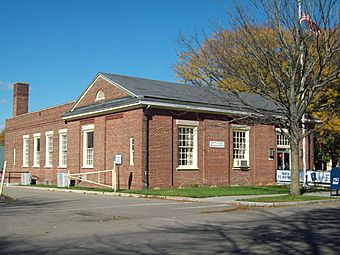United States Post Office (Painted Post, New York) facts for kids
Quick facts for kids |
|
|
US Post Office-Painted Post
|
|

U.S. Post Office, Painted Post, New York, October 2009
|
|
| Location | 135 N. Hamilton St., Painted Post, New York |
|---|---|
| Area | less than one acre |
| Built | 1937 |
| Architect | Simon, Louis A.; Jones, Amy |
| Architectural style | Colonial Revival |
| MPS | US Post Offices in New York State, 1858-1943, TR |
| NRHP reference No. | 88002395 |
| Added to NRHP | May 11, 1989 |
The US Post Office-Painted Post is a historic post office building located in Painted Post, New York. This building is a great example of old American architecture. It was designed in 1937 and finished being built in 1938. It's not just any post office; it's a special part of the town's history.
Contents
What Makes This Post Office Special?
This post office was designed by Louis A. Simon. He worked for the U.S. government's Treasury Department. His job was to oversee the design of many post offices across New York State. The Painted Post Post Office is one of these unique buildings.
Its Classic Look: Colonial Revival Style
The building is a single-story structure. It is made of red brick. Its design follows the Colonial Revival style. This style brings back popular looks from America's colonial past. Think of classic, elegant homes from the 1700s. This style often uses simple shapes and balanced designs.
A Hidden Treasure: The Mural Inside
Step inside the post office, and you'll find a cool surprise! There is a large mural painted on the wall. This mural was created in 1939 by an artist named Amy Jones. The artwork is titled "Recording the Victory." It shows a scene from the American Revolutionary War. Murals like this were often added to public buildings during that time. They helped to tell stories about American history.
Why Is It a Historic Place?
The US Post Office-Painted Post is important because of its history and design. It was officially added to the National Register of Historic Places in 1989. This list includes buildings, sites, and objects that are important to American history. Being on this list helps protect the building. It makes sure it can be enjoyed by people for many years to come.
 | James Van Der Zee |
 | Alma Thomas |
 | Ellis Wilson |
 | Margaret Taylor-Burroughs |



